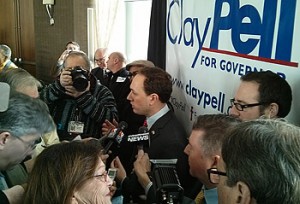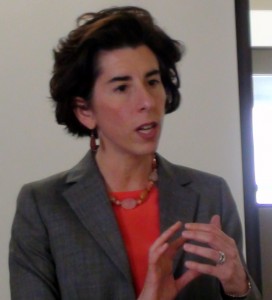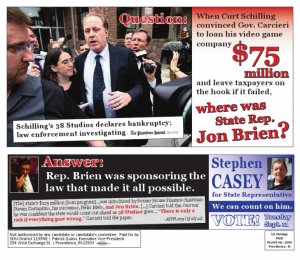 Make no mistake about it, Bernie Sanders remains a long shot to be the next president of the United States.
Make no mistake about it, Bernie Sanders remains a long shot to be the next president of the United States.
So you’re telling me there’s a chance, the loyal Sandernistas respond. As well they should.
Yes, there’s still a chance Bernie Sanders can finish the primary season with more pledged delegates than Hillary Clinton. And after last night’s big win in Wisconsin, New York next week becomes even more consequential. It’s Clinton’s home court but Sanders is predicting victory. There are 247 delegates at play to distributed proportionally and a debate in Brooklyn, where Sanders grew up and Clinton has her campaign headquarters, four nights before the polls open.
 If Sanders can win New York and then elsewhere in the Northeast (that’s us, RI! 24 delegates), California (475 delegates) can and will make it anyone’s ball game.
If Sanders can win New York and then elsewhere in the Northeast (that’s us, RI! 24 delegates), California (475 delegates) can and will make it anyone’s ball game.
According to this New York Times interactive tool, Sanders needs to win roughly 58 percent of the delegates in the remaining 19 states. Winning 57 percent in Wisconsin wasn’t enough, but it didn’t damage his chances either. New York and California have by far the most delegates, and wins of any size by either candidate likely completely scramble these numbers. Polling in both New York and California still favors Clinton, but that’s been the trend in almost every state Sanders has gone on to win.
That’s the math. Analysts who have long called Clinton the inevitable nominee are loathe to admit this, but it doesn’t seem like it’s over to me. Sanders need only to perform as well as Villanova did against North Carolina to pull off this electoral upset. That not impossible, and maybe not even unlikely given he’s beat the expectations all primary season long.


This presidential election cycle has me a bit confused, especially on the Democratic side. It seems that many of our leaders have forgotten that we are a nation of revolutionary ideas.
I’m a millennial who enlisted in the Marine Corps in 2001, emboldened by the fervor of unity that swept our country after the 9/11 attacks. Mix the boundless ego of a Marine with an 18-year-old’s propensity for taking risks and it seemed all things were possible.
But you don’t need to be a Marine to believe that we’re capable of big things. Any entrepreneur worth their salt has pushed the envelope with an almost irrational belief in their capacity to make big things happen. Most of us know what it’s like to be a young child with limitless curiosity, a hunger to explore, and a fearlessness to peer into the unknown.
It is that fearlessness and vision that gave birth to a revolution, one that would shape the future of the world. It was our revolution and it happened not all that long ago in the grand scheme of things.
The story of America isn’t a fairy tale. The men who created it weren’t gods, they were human. When did we become so timid about big ideas?
We created a self-governing republic that was unlike any other that came before it. This is our history. And the people who led this revolution and the people who fought this revolution were not super human. They were finite, they were flawed, but they were courageous.
America desperately needs a John Adams, a Jefferson. It desperately needs a people so belligerently unaccepting of social injustice that they rise up with their vote, their voice, and their aspirations.
No matter the cause of our sleepy abdication of power, we are still a self-governing republic. No matter the influence of big money, our vote cannot be bought. And there are still big ideas worthy of our history.
Ideas like making healthcare a civil right, converting our energy system from fossil fuels to renewables, and ending a corrupt campaign financing system that reduces our politicians from statesmen to frenetic fundraisers.
We didn’t draft the Declaration of Independence thinking, “Nothing will ever change anyway, why even try.” Men and women didn’t sacrifice everything they had on earth saying to themselves, “Freedom would be really awesome, but it’s not pragmatic or realistic.”
Stop being so cautious America. If there’s anything about who we are as a people that we can agree on, it’s that we’re revolutionary. Start acting like it.
]]>
In some ways, the Democratic primary for governor is an epic battle between two factions of the party.
Angel Taveras, the progressive mayor of Providence who saved the city from fiscal disaster is in a public slugfest with Gina Raimondo, the well-heeled, Wall Street insider infamous for cutting pensions and investing the savings in hedge fund fees.
After beginning the campaign by negotiating a Peoples’ Pledge, Taveras and Raimondo are now running dueling attack ads on each other. And late last week their feud reached fever pitch when the Raimondo camp accused a Taveras supporter of sneaking into an event and trying to steal her cellphone. (The Taveras campaign apologized for the first transgression and denied the other.)
Such sleaziness would be the bigger news if it wasn’t for Clay Pell. Everyone is most abuzz about his people-powered, positive campaign strategy. Couple that with millions of his own money, and it could prove to be a winning strategy.
Unless it ends up just being the spoiler strategy.
Many expect Pell to make a huge leap in the next round of polling. But few expect it will be big enough to win. He may well best Taveras in the end, but it seems most-likely that Raimondo will beat them both. While Pell and Taveras split the left, Raimondo is drawing new conservatives into the Democratic Party – I know of at least one longtime Republican who plans to vote for Raimondo in the Democratic primary this year. And if Raimondo wins the primary, a swarm of influential liberals will give serious consideration to voting for a Republican.
So even as the drama unfolds between Wall Street and Main Street Democrats, the left’s lack of ability to agree on a candidate may have already guaranteed Rhode Island’s next governor will be a conservative.
]]>
On Monday, General Treasurer Gina Raimondo kicked off her campaign to be the Democratic nominee for governor by announcing a broad platform. Among them, rebuilding public school buildings, an assault weapons ban along with tougher gun control, college loan forgiveness, raising the minimum wage and indexing it with cost-of-living-adjustments, providing universal pre-K, allowing undocumented workers access to drivers’ licenses, utilizing social impact bonds to fight poverty and social problems, and holding Wall St. accountable.
Had it been announced by any other candidate it would’ve been hailed as the most progressive platform laid out by a RI gubernatorial candidate in a generation.
Even the campaign of Mayor Angel Taveras, who is running for governor in the same primary, didn’t fault it. When asked by The Providence Journal if they disagreed with a single point, Taveras’ campaign manager replied, “no.”
But progressives didn’t hail it as a high-watermark in years of their organizing and work. As architect of the 2011 pension cuts that wreaked havoc on public sector employees in the midst of Rhode Island’s stalled “recovery” from the recession, the general treasurer still has light-years to go to win back the unanimous left-wing support she enjoyed when she waltzed to victory in 2010. Since ushering pension cuts through the General Assembly, the treasurer has remained remarkably out of sight with the exception of a few financial literacy courses and support for payday lending reform. The effective use of the bully pulpit that she displayed in 2011 was noticeably lacking in 2012 and 2013. Her most high-profile media appearances have been to defend pension cuts or argue for the repayment of the moral obligation bonds secured for the 38 Studios fiasco (another of the many dark clouds that hang over Rhode Island politics).
The 2011 pension cuts have been characterized by national critics such as Ted Siedle and Matt Taibbi as a Wall St. cash-grab, and so local progressives seized upon the under-the-radar concept of social impact bonds (SIBs) to tie the treasurer more closely to Wall St. Longtime fiscal policy observer Tom Sgouros asked in his evaluation of the concept whether Raimondo intended “to promote the public good, or sell it?”
Social impact bonds are easy to tar and feather. First, they contain the word “bond” and Rhode Islanders have seen a string of negative implications of what happens when bondholders come looking for money. The reality is that the treasurer used language out of step with the U.S. federal government. The Feds have used the more accurate “pay-for-success contract” to describe the concept. If the bond doesn’t produce success, there’s no payment from the government; which is why this is attractive to governments. The risk falls on the private investor, rather than the public purse. And unlike the 38 studios bonds, if a SIB fails to register satisfactory results, investors don’t get their money back. They lose it.
Second, their pedigree includes Goldman Sachs. Yes, the investment bank was a major backer of an initiative by New York City Mayor Michael Bloomberg to use the bonds to reduce recidivism among 16-18 year olds leaving Rikers Island. But the concept was initially begun at HMP Peterborough in the U.K. There the backing was from a collection of philanthropies rather than an investment bank. Other U.S. attempts have used a blend of charity and private funding. The left-leaning Roosevelt Institute suggested that SIBs “have the potential to be an important tool in the poverty-fighting arsenal.” Harvard’s Kennedy School of Government even has a guide for state and local governments on how to manage SIBs.
Third, the concept has been so low-key in Rhode Island that even our paper of record, The Providence Journal, suggested that Raimondo “had introduced a new concept to Rhode Island’s political lexicon.” In reality, the idea had been consigned to business reporting until Raimondo mentioned it Monday. Rhode Island’s very own Social Enterprise Ecosystem Economic Development (SEEED) has been exploring SIBs already (and bringing them to the attention of both Raimondo and Governor Lincoln Chafee). Master’s students at Brown’s Taubman Center also researched the concept focusing on recidividism.
So it’s neither a bond (at least not as we’ve become accustomed to them in Rhode Island), nor created by Goldman Sachs, nor a concept unique to the treasurer and her venture capital background. We may be entering a new Raimondomania. Whatever comes out of the treasurer’s mouth is instantly controversial. You can count on the media to cover it, and you can count on progressives to denounce it if they’re not familiar with it; usually with the words “Wall Street” to boot.
Yes, the treasurer is deserving of tough criticism. She’s repeatedly made it clear that our contract with the workers who built our state is less important than our contracts with bondholders who were already insured against losses. She made a previously backwater office a major part of the political landscape, achieved a stunning legislative success, and then squandered the next two years by not vociferously pushing the progressive agenda she was elected on. All of the treasurer’s platform ideas could’ve been pushed for and passed in the General Assembly throughout her current term. She rarely lent her weight to these causes. And there’s no EngageRI to provide muscle to rebuild public school buildings or offer college-loan forgiveness.
But the progressive response to Raimondo’s progressive platform is typical of the left-wing infighting that all too often prevents success. Instead of achieving the 99% of things they agree upon, the left will slaughter one another over the remaining 1%, stymieing progress and allowing conservatives to win policy changes they needn’t have.
Social impact bonds are a prime example of this. Yes, the optimal outcome would be for the state to invest in the solutions and save itself the maximum amount of money possible, to be reinvested elsewhere. However, our state legislators have proven unwilling to do the heavy lifting themselves, preferring instead to look towards business for solutions. Social impact bonds aren’t ideal, but they’re better than doing nothing. If they fail to work, they cost the state nothing. Most importantly, they achieve the progressive goal of helping people immediately rather than in some fantastical future when progressives control both chambers of the General Assembly and the governor’s office and are able to pass their agenda without resistance. Perhaps social impact bonds will be the kick that makes our legislators realize they could just save all this money instead of passing a share of the savings on to private investors.
There is a very real possibility that Raimondo will win the primary and then go on to being the first elected Democratic governor since Bruce Sundlun. Should that come to pass, progressives will have a duty to fight Raimondo if and when her agenda damages the economic health of our state and hurts our people. But when a Governor Raimondo’s agenda aligns neatly with the progressive agenda, then it’s time to applaud and support it. If progressives can’t recognize that even the most controversial part of Raimondo’s platform moves Rhode Island closer to alleviating societal ills then how can they lay claim to being the champions of the downtrodden and dispossessed?
]]>
In the last few years the General Assembly has passed legislation that slashed pensions, cut taxes on the wealthiest Rhode Islanders, recklessly combined the State’s boards of education, and instituted a discriminatory and unnecessary Voter ID law. And, of course, all while under the auspices of the Democratic Party.
It’s no secret then, that progressives are dissatisfied with the status quo of Rhode Island. There have been victories; notably marriage equality. But marriage equality only arrived after a compromise of civil unions riled up enough people that there was a large-scale campaign to gain true equality before the law. Full progressive change in Rhode Island happens when there is a confluence of outrage and money.
What has tided progressives over is a series of compromise: the most progressive change possible, the most progressive candidate possible. U.S. Sen. Sheldon Whitehouse, U.S. Rep. David Cicilline, and Gov. Lincoln Chafee are all beneficiaries of this. While some of them have not been the most progressive candidate in their races, they have been the most progressive candidate possible.
But recent events in New York City and Boston have empowered progressives across the country, and Rhode Island progressives especially have taken note (sandwiched, as they are, between those two regional poles). Candidates with explicitly progressive campaigns have won mayoral races in those cities in off-election years. The New York City example of Bill de Blasio is especially hopeful. NYC has a population of somewhere around 7 times larger than the entirety of Rhode Island, which despite a Democratic majority has been ruled by non-Democrats since 1994, the last full year in which there was a Democratic governor in Rhode Island.
If it can happen in New York and Boston, then it can happen here, the reasoning goes. As Rhode Island progressives eye the governor’s race, they may start drawing parallels with New York City. This may explain the hoopla over Clay Pell, the untested scion of Rhode Island’s greatest political legacy.
There are a few factors to consider. First, progressives may believe they are the Democratic Party, but that’s ultimately false. Many of Rhode Island’s Democrats are more accurately described as “Christian democrats” generally socially conservative but supportive of social justice and welfare. These are the elder type of Democrats, part of the party before the progressives split from the Republicans. The reality is that Rhode Island’s Democratic Party incorporates three general sections; the progressives, the Christian democrats, and the neoliberals. There are also some genuine conservatives.
However, of these three wings, the progressives are by far the most politically dangerous and important. Time and time again they’ve proven they can break or make Democratic candidates. Therefore, it’s not surprising to see all Democratic candidates in the gubernatorial primary proclaim themselves progressives.
Progressives have a pastime of DINO-hunting, which generally means weeding out the Christian democrats or neoliberals. But as the gubernatorial race approaches, they may find themselves hunting progressives-in-name-only instead. I doubt I’m wrong in thinking that progressives believe that if the first elected Democratic governor is coming in 2014 they’ll allow that governor to be anything short of a true-blue progressive.
Providence Mayor Angel Taveras is especially vulnerable to the whims of progressive fervor. He’s managed to position himself somewhere between the neoliberal position and the progressive position. Meanwhile, General Treasurer Gina Raimondo has been firmly defined as part of the neoliberals; the “Wall St. Democrats.” But that line-walking is not playing as well as it should. On a recent appearance on WPRI’s Newsmakers, when pressed by Ted Nesi, Taveras was unable to draw a distinction between himself and Raimondo in terms of actual policy, suggesting that it’ll come out in the campaign.
On one hand, that’s correct; and politically it’s unnecessary to draw a distinction this early when Rhode Islanders won’t be paying attention for another year or so. But on the other, those contrasts should be clear already, especially as activists begin examining the candidates closely and building enthusiasm for campaign season.
Taveras’ vulnerability is clear in Clay Pell, as ill-defined a candidate as ever there was. We know virtually nothing about him beyond the name, a brief biographical sketch, and that his wife is Olympian Michelle Kwan. Yet Pell is bending progressives towards his center of gravity, and that should be worrying this early. His grandfather was also a relative unknown who defeated two former Governors for his U.S. Senate seat.
Despite their strengths, one shouldn’t think of the progressives as a wholly deciding factor though. For one thing, the movement is, like most things in Rhode Island, fractious and full of personalities. With the disbanding of Ocean State Action, the main meeting table and organizing presence for progressive groups has been removed. For another, what gets defined as truly “progressive” is open to debate. And finally, while the gubernatorial race will gain the most attention, the real power lies in the General Assembly, where progressives will have to focus on electing more friendly candidates as well as protecting those they already have.
2014 will be a serious test for progressives in Rhode Island. Can they elect a governor who represents their values? Can they take a controlling majority in the Assembly? And should they manage that, will they be able to produce results and right Rhode Island after years of neoliberal failure?
]]> Yes, I was smiling when I read the news that Angel Taveras had called for a People’s Pledge in the RI Democratic Primary for Governor. Common Cause RI pointed to the study by Common Cause MA that the 2012 People’s Pledge for the race between Elizabeth Warren and Scott Brown reduced the amount of influence of outside groups in the election.
Yes, I was smiling when I read the news that Angel Taveras had called for a People’s Pledge in the RI Democratic Primary for Governor. Common Cause RI pointed to the study by Common Cause MA that the 2012 People’s Pledge for the race between Elizabeth Warren and Scott Brown reduced the amount of influence of outside groups in the election.
Then, I read Gina Raimondo’s response: we’ve already been attacked by special interests, donate the full amount AFSCME paid for the Seidle Report. I may have boiled it down a bit.
My initial thought was “savvy move, Raimondo, savvy move.” Except when I pause to think about it, it’s not really. Taveras has already been attacked as well; notably in totally unfocused ones by the American LeadHERship PAC that couldn’t decided whether the mayor was a political insider or a political novice. Taveras could’ve opened his push for a People’s Pledge by suggesting that would be a place to start for Raimondo, but he didn’t. Which is rather congenial, considering those were nutty political attacks.
It appears that the harrowing few weeks of negative press from progressive left media like Salon and Rolling Stone and the center-leftish The New York Times on pension reform (something which Raimondo could’ve foreseen when she started accepting awards from right-wing think tanks) have raised hackles in the Treasurer’s camp (after decades of ignoring them, suddenly every Rhode Islander is an expert on investing pensions).
Asking Taveras to donate money for something AFSCME is independently angry about makes as much sense as Taveras suggesting Raimondo donate the People’s Pledge amount of the attacks on him over the Davey Lopes pool. When you make decisions that are part of your office, criticism of you by the people effected is expected (and justified). Just because you’re about the engage in political campaigning doesn’t mean you get to wave a wand and say “politically-motivated, don’t have to listen.” You take it, even if it sucks.
Political observers are free to read the tea leaves as they will. I’m sure pro-Raimondo partisans will read this as a political ploy on the Mayor’s part, attempting to handicap the Raimondo campaign (who seems most likely to benefit from outside spending). Pro-Taveras partisans will read this as unease on the part of the Treasurer, who even with a nearly 3:1 money advantage may be unsure if she can win a Democratic primary likely to tilt to the left without outside help.
I’m sure people think I’m marked in the Taveras camp because I write for RI Future and other reasons. But I want to be clear. I don’t see much, policy-wise, that differentiates the two candidates. I think Gov. Raimondo will make policy choices that a Gov. Taveras would also make, and vice versa. I wasn’t just calling for a People’s Pledge in this post last month, I was calling for a substantive (and civil) debate on issues. For one thing, I’d like for the RI Democratic Party to have a primary that wasn’t just a referendum on whether the 2011 pension reform is popular among Democratic-affiliated voters and Democratic primary-voting unaffiliateds.
What it appears to me is that there seems to be a personal animus between the candidates and their camps, which is more likely to scuttle anything than other issues. Which is why I fully expect this primary to devolve, though I sincerely wish it wouldn’t. Rhode Islanders deserve a good campaign focused on things more than bloody socks and telling the President to shove it.
Perhaps whoever triumphs in the Democratic primary will find candidates more receptive in the general election to a People’s Pledge, if this one sinks (Common Cause RI has already called for a general election People’s Pledge). Or maybe we’ll have to rely on down-ticket races to act as pathfinders for the big races and establish a tradition of People’s Pledges. As Rhode Islanders well know, an established tradition can be a powerful tool in enforcing compliance in a practice.
P.S. There’s also a media issue here, which is that discussion of the People’s Pledge gives the media a chance to remind us about the ol’ campaign finance scoreboard and tell us what it told us earlier this month. Guess what folks, we’re not voting on whether we prefer the $2 million candidate or the $690K candidate! Cash on hand does not equal a good governor.
]]>Last week, I filed several independent expenditure reports with the RI Board of Elections on behalf of my organization, SEIU District 1199NE — the union representing nearly 4,000 private-sector health care workers throughout Rhode Island. The reports detailed our spending in support of four candidates in this past Tuesday’s primary elections.
 Among them was an expenditure of $834.57 for a mailing sent to frequent primary voters in Woonsocket’s House District 50, critical of State Rep. Jon Brien’s sponsorship of legislation paving the way for the disastrous 38 Studios deal. This expense was so small that it wasn’t even required to be reported under the state’s new disclosure law. According to some reports, however, it may have had a big impact on the race — where Brien lost by 50 votes to first-time candidate and city firefighter Stephen Casey.
Among them was an expenditure of $834.57 for a mailing sent to frequent primary voters in Woonsocket’s House District 50, critical of State Rep. Jon Brien’s sponsorship of legislation paving the way for the disastrous 38 Studios deal. This expense was so small that it wasn’t even required to be reported under the state’s new disclosure law. According to some reports, however, it may have had a big impact on the race — where Brien lost by 50 votes to first-time candidate and city firefighter Stephen Casey.
In my opinion, there were many reasons to vote against Rep. Brien. I don’t know the man personally, but most of his views are the exact opposite of mine (except perhaps for our mutual admiration for the roast beef sandwiches at the Beef Barn). He often seemed more focused on building his profile with business interests, ALEC and the right-leaning Washington think-tank crowd than with actually helping the people of Woonsocket.
For example, Brien did little to help during my union’s recent fight to restore $24 million in funding that had been cut from programs serving the developmentally disabled — despite the importance of agencies like Seven Hills of Rhode Island to many families in Northern RI. Meanwhile, he adamantly supported costly tax breaks that only benefit the wealthy – embracing the failed & disproven “trickle-down” theory of economic growth, depriving our state of revenue that could have more than restored the cuts to these vital services, and condemning direct care support staff to a life of poverty.
But the 38 Studios debacle (and the mindset that brought it into being) stood out as an event that deeply angered everyone across the state, regardless of their political leanings. Rep. Brien was one of three sponsors whose names appeared on the law that enabled the EDC to loan $75 million to Curt Schilling’s risky video game company, but left Rhode Islanders on the hook when it failed.1
 Brien claimed that the wool had been pulled over his eyes, that he was sold a bill of goods, and that he didn’t know that all of the funds would be poured into one company – but it appears these excuses simply weren’t good enough for most voters, who decided it was time for a little Reckoning of their own.
Brien claimed that the wool had been pulled over his eyes, that he was sold a bill of goods, and that he didn’t know that all of the funds would be poured into one company – but it appears these excuses simply weren’t good enough for most voters, who decided it was time for a little Reckoning of their own.
There were other factors, of course – and you won’t find me claiming that one postcard could magically beat a 3-term State Representative from a political family with deep roots in the city. From what I’ve read, it appears that Stephen Casey related well to many voters. On election night, he told the Valley Breeze that he had knocked on over 900 doors. That’s the kind of hard work that wins elections – but it didn’t stop Rep. Brien from crying foul:
“I worked really hard and I think I represented the district well,” said Brien. “I think that the outside influences from out-of-town, spending a lot of money on these races, worked really hard to target certain people. That’s the nature of the beast. I was targeted by many of the labor unions from around the state.”
What Brien fails to mention (because his venom sac runneth over when it comes to workers’ organizations) is that my union was vastly outspent by a corporate-backed alliance that dropped just over $11,225 in a failed attempt to protect him. That’s more money than even Rep. Brien’s own campaign could raise and spend.
 As Ted Nesi noted, this group — the 50CAN Action Fund2 — received $160,500 from Michael Bloomberg, the billionaire Mayor of New York City, and $50,000 from Jonathan Sackler, an heir & executive at Purdue Pharma (the maker of OxyContin) in addition to $2,500 from one Rhode Islander, Angus Davis. So we have a situation where three wealthy individuals (but let’s be honest, it was mostly the non-Rhode Islanders3) spent more money on the outcome of one Woonsocket general assembly primary election than the nurses, CNAs, and other health care workers who belong to our union.
As Ted Nesi noted, this group — the 50CAN Action Fund2 — received $160,500 from Michael Bloomberg, the billionaire Mayor of New York City, and $50,000 from Jonathan Sackler, an heir & executive at Purdue Pharma (the maker of OxyContin) in addition to $2,500 from one Rhode Islander, Angus Davis. So we have a situation where three wealthy individuals (but let’s be honest, it was mostly the non-Rhode Islanders3) spent more money on the outcome of one Woonsocket general assembly primary election than the nurses, CNAs, and other health care workers who belong to our union.
Unlike these donors, our members live and work in the Ocean State, and have a real stake in Rhode Island’s future. In House District 50, this group outspent us by nearly a 14-to-1 margin4 — so it seems to me that Rep. Brien’s real complaint should be that his rich independent benefactors weren’t particularly smart at directing their investments — an ultimate irony, of course, for these illustrious captains of finance.
But if it’s any solace to those who truly object to the interventions that my organization and others made in the recent election, let me say this: so do I.
 Unfortunately for us all, the Supreme Court’s “Citizens United” decision has opened the floodgates for unlimited spending by corporations, wealthy individuals, and unions – though most observers acknowledge that workers’ organizations don’t have pockets nearly as deep as the CEOs. Independent expenditures didn’t begin with “Citizens’ United,” but the decision has paved the way for untold sums of money to be dumped into our local, state, and federal elections.
Unfortunately for us all, the Supreme Court’s “Citizens United” decision has opened the floodgates for unlimited spending by corporations, wealthy individuals, and unions – though most observers acknowledge that workers’ organizations don’t have pockets nearly as deep as the CEOs. Independent expenditures didn’t begin with “Citizens’ United,” but the decision has paved the way for untold sums of money to be dumped into our local, state, and federal elections.
If we abandon one of our most important founding principles as a country — a government of, by, and for the people — the very future of our democracy is at stake. For our part, SEIU believes that the Supreme Court decision should be immediately overturned, and that laws must be passed to ensure that the voices of ordinary Americans are not drowned out by the wealthy and corporations in our political process.
In the meantime, however, our members will not unilaterally disarm. We’ll be in the trenches, working to stop politicians who believe that corporations are people, and who are eager to do the bidding of the wealthiest 1% — those who are growing ever-richer while the standard of living for the vast majority of Americans continues to decline, and who seek to further dominate the political process, distort our democratic institutions, and turn our government into an auction house.
Our union believes that we need to build a movement of all Americans across political and party lines to make sure that the voices of ordinary people will be heard in our democracy, today and always. With that, I’ll offer two parting thoughts for Rep. Brien, if he is genuinely concerned about the influence of money in politics, and not just at the times when it doesn’t work out for him personally:
 First, if ALEC still keeps you on their board after voters have shown you the door, maybe you can parlay your current misfortune into convincing the Koch Brothers, ExxonMobil, and the other CEOs and corporations to change ALEC’s position on unlimited corporate spending on elections.5 As John Nichols described it last year in the Nation:
First, if ALEC still keeps you on their board after voters have shown you the door, maybe you can parlay your current misfortune into convincing the Koch Brothers, ExxonMobil, and the other CEOs and corporations to change ALEC’s position on unlimited corporate spending on elections.5 As John Nichols described it last year in the Nation:
[ALEC] has no problem with policies that increase the likelihood that the candidate with the most money and corporate support will prevail. Its 2009 Resolution Supporting Citizen Involvement in Elections bluntly “opposes all efforst to limit [citizen] involvement by limiting campaign contributions.” A resolution approved [in 2010] expresses support for the Supreme Court’s Citizens United ruling.
Second, if that doesn’t work out (my prediction: it won’t), I’m willing to bet that Common Cause would let you join as a member and stand with them to work for fair elections and stronger rules governing the influence of money in politics.
Heck, if you are able to kiss and make up with their director, I’ll even pay the $40 for your membership! The only issue would be that Rhode Island’s ethics code prohibits gifts of more than $25 to a member of the general assembly.
So can you remind me: when is your last official day in office?
(1) Now-retired State Rep. Bob Watson was the lone ‘NO’ vote on the deal – which you can either credit to his powers of legislative discerment, or to the fact that he was a constant contrarian on just about everything at the General Assembly, so eventually he was bound to really get one right!
(2) The group, which purports to stand for educational opportunities for poor children in urban schools, boggled many minds when it gave Brien an “A+” grade, given his intense opposition to our state’s DREAMers who simply wanted to be able to afford to go to college after they graduate high school, and whose only “offense” was being undocumented because they were brought here at a young age.
(3) Given their out-of-state base, it’s no wonder 50CAN got geographically confused with a couple of their mailers. If they had heard about Casey’s beer and dynamite fundraiser, we may have even seen an attack mailer accusing him of mixing alcohol with explosives.
(4) There were other unions that reported conducting Independent Expenditures in HD-50 – their reports showed $18,000 and $5,000 spread over 25 races (an averge of $920 per race). Even if twice the average had been spent going after Rep. Brien (I highly doubt it – voting history shows that this is a fairly low-turnout district), all of the union money combined against Rep. Brien still would have been four times less than the corporate money supporting him.
(5) You can read ALEC’s resolutions from both before and after the Citizens United decision, though you’ll have to filter through the cluttered layout of the critique (apologies, but those were the only versions I could find on-line – strangely enough, ALEC appears to have removed the originals from its own website).
Public Schools
The Journal‘s Edward Achorn asked a leading question about supplying school vouchers. Thankfully, neither David Cicilline or Anthony Gemma support those. But if you thought Democrats were staunch defenders of public schools, you might be asking yourself if you could get some new defenders.
Gemma Says Providence Public School Grads Are Stupid
This had to be the point when I, personally, wanted to strangle Mr. Gemma, because he wasn’t just attacking Mr. Cicilline (I don’t particularly care about that), he was attacking me and my friends. He attacked pretty much anyone who passed through Providence Schools from the years of 2003 and 2010. Actually, RI Future contributor Steve Ahlquist has the best line on this, so let me quote his tweet:
#WPRIdebate Gemma says my kids were failed by Providence School system. I’ll call my daughter at Cornell, break the news to her.— steveahlquist (@steveahlquist) August 29, 2012
Full disclosure, I attended the same schools as Mr. Ahlquist’s daughter for 12 years. Unlike Mr. Gemma’s descriptions of us, we can, in fact, “read and write and do math” and are not in need of adult education. A great many Providence school grads are, contrary to the rumors produced by the haters, “productive members of society.” In fact, I can do statistical analysis, and my writing skills are on display here, and I’ve graduated from a four-year college in four years. Actually, from the time I graduated high school in the fifth year of Mr. Cicilline’s term, to 2010, four year high school graduation rates in Providence were higher by 10 percentage points (increasing from 58% to 68%). What probably keeps Providence grads from being even more productive members of society is the lack of jobs.

But the big problems with Mr. Gemma’s statements are that he over-relies on testing data, which is a crappy way of measuring education success. Kristina Rizga, of Mother Jones, recently published an article entitled “Everything You’ve Heard About Failing Schools Is Wrong“. In it she discusses just how distorting testing data is. And just how detrimental it is to good schools that people love. Her key line about getting good information other than testing data about how schools are doing: “It’s easier for a journalist to embed with the Army or the Marines than to go behind the scenes at a public school.”
And then, while trying to blame Mr. Cicilline for Providence’s problems, Mr. Gemma notes the issue is across the urban core. So either Mr. Cicilline is part of a trend of RI’s urban areas doing poorly on tests (speaking to structural/environmental issues), or he’s responsible for all of the urban areas doing poorly. I’d say the biggest problem with Mr. Cicilline’s tenure over my schools is that the department would hire a bunch of people who aren’t in the schools but seem to have all the answers to show up for like two years, and then leave when a higher paying job opens up. No one deigns to ask the students what’s going wrong. And here’s the thing, students have identified all the problems in the day-to-day operation of their schools. They know just what’s going wrong for them. No one in power is asking teachers what problems they’re having (other teachers are).
Hopefully the collaboration between the teachers’ union and the administration in Providence will yield some results. If they engaged the students via any one (but hopefully all) of the great student organizations in Providence, the schools would probably see incredible improvements.
Cicilline Says Kids Need to Compete

I hear this a lot, George W. Bush said it as he inaugurated No Child Left Behind, tons of people talk about the need for children to compete. And it’s stupid. Look, if you want future American workers to be competitive with kids in India and China, educating them more is not the way to go. Notice how no one ever says we have to have our compete with top-ranked nations for education like Finland or South Korea. It’s always Mexico, Indonesia, and China we have to struggle against. That’s because the most competitive workers are the ones who don’t know any better.
I mean, what’s the cheapest worker? A slave or a serf. No one ever heard a slave owner or a feudal lord go, “man, if only my peons were more educated. Then they’d be more competitive.” No. It was “keep those books away from them. If they get too knowledgeable, they won’t know their place. No one wants to purchase an unruly worker.”
We used to understand this (ironically, back when there was actual slavery in this country’s living memory). We didn’t put public schools in place to produce workers. Horace Mann, the father of our public school system, wanted good American citizens. That’s the purpose of public education; to provide intelligent citizens. You know what doesn’t produce good citizens? Testing that demands that kids only know rote writing, reading, and math; and teaching that only supplies that. You want competitive workers, privatize and revert back to the past when only the wealthy got education. Then you’ll get people who don’t know any better but to take bad jobs at terrible wages.
You want good citizens who will build a strong America? Teach them how to think and question and argue and study. Teach them history and literature and philosophy and government and economics and science. Teach them how to be people, and not drones.
College Costs
Are you in debt? Yes? For that college education you got? Still? You mean, you didn’t graduate college and get that $40,000 a year job your college told you their average grad makes a year out of college? Weird. It’s almost like there’s terrible unemployment or something, and government no longer cares about full employment. Well, you can always go bankrupt. What? You can’t discharge your debt with bankruptcy? Good luck with that. When WPRI’s Ted Nesi asked this question to the candidates, they weren’t much help to the college student/graduate (full disclosure: I graduated college in debt).
Cicilline: Boy, That’s a Big Challenge
Damn right it is; college is where they teach both rocket science and brain surgery. Mr. Cicilline sure noted it was difficult, it would absolutely get more difficult much faster under Republican proposals, but he seemed mightily befuddled about how to solve the fact that over the last 30 years, the cost of college has risen 1120%. I suppose it’s worth noting that in 1980, Pell Grants covered 69% of a four-year, public university degree. In 2013, they’ll cover less than a third, a level of coverage that is the “lowest in history.” This despite their maximum amount being increased. Mr. Cicilline’s “that’s a difficult question, let’s have a conversation about this” approach doesn’t seem to me to signal the correct response to the immediacy of this problem. We could’ve talked about this in the late ’80s or early ’90s when the costs outstripped the Consumer Price Index. We should’ve been marshaling solutions in the early 2000s when it broke a 500% increase from 20 years before. But in 2012, we gotta say, “enough is enough, college costs are going to come down.” If that’s more government investment, or government interference, or a debt jubilee, or whatever, it doesn’t matter. By any means necessary, we cannot have colleges creating a new cohort of debtors every year. Frankly, a college education is not worth the amount we are paying for it.

Gemma: Race to the Top!
Faced with this, Mr. Gemma could only go with “benchmarking against other institutions.” When Mr. Nesi pointed out that Harvard University is the top ranked college in the world, and its costs are ludicrously high, Mr. Gemma said something like, “well, benchmark against savings on paper goods.” Paper goods. Seriously. You know where we could save a ton of money on a paper good? Ending the cartel of book publishers which keep textbooks outrageously high (your seventeenth edition of Econ 101 is not worth $500, by any measure).
Mr. Gemma pointed out Race to the Top as an example of a way to benchmark. Now, all due respect to President Obama, but Race to the Top is George W. Bush’s No Child Left Behind-lite. It’s privatize, privatize, privatize. And private colleges are the ones that are really getting outrageously expensive, as the amount (and salaries) of administrative positions bloat budgets and colleges focus on amenities rather than professors to attract wealthy students. And that’s not to even get into for-profit colleges, which offer often fraudulent degrees at prices far above any other higher education institutions. So in the face of increased costs from the private sector, Mr. Gemma would look to the private sector for solutions on cutting costs?
Claiborne Pell, we need you now, more than ever.
]]> I’m going to go out on a limb here and argue against our editor Bob Plain’s article that Anthony Gemma should drop out of the race for Democratic nominee for Congressional District 1. Now, obviously, it’s not because I have any particular love for Mr. Gemma. It’s because I’m a radical democrat.
I’m going to go out on a limb here and argue against our editor Bob Plain’s article that Anthony Gemma should drop out of the race for Democratic nominee for Congressional District 1. Now, obviously, it’s not because I have any particular love for Mr. Gemma. It’s because I’m a radical democrat.
I believe in the application of democracy, that our ideas and politicians have to be challenged in order to strengthen them. Representative David Cicilline shouldn’t get a free ride (though, obviously, no one can really accuse him of that since Providence Mayor Angel Taveras announced a “category 5 hurricane” about the city’s finances). I think that, regardless of how much I personally feel that between Mr. Cicilline and Mr. Gemma that Mr. Cicilline is clearly the better candidate, Mr. Gemma needs to stay in the race.
This should apply to everyone. In our democracy, it’s a shame that anyone ever stands in any election unchallenged. I’m not deaf to the idea that sometimes the best candidate is already in office, but I sincerely doubt it always applies. Everyone needs to be capable of defending their ideas; those who don’t tend to get sloppy. Even worse, they can get entitled. Mr. Cicilline clearly never got the chance to feel entitled to his seat; when Mr. Taveras made his now famous remarks as to the city’s financial condition, the uphill battle began. Everyday since then has been a justification of why Mr. Cicilline should remain in office. That‘s a good thing. These telephone town halls, while pretty ubiquitous, have been a departure from Patrick Kennedy’s tenure when the representative was… someplace, talking to some people.
Mr. Gemma serves a purpose; to ask the question “can Mr. Cicilline serve as the Democratic Party’s standard-bearer for Representative in RI CD-1?” However terrible an instrument Mr. Gemma is for that purpose, we’ll know the answer on September 11th.
This principle should’ve extended to the Republican race as well. John Loughlin II dropping out was bad for Rhode Island. It denied Republicans the chance to vet their candidate. Hopefully, Michael Donahue can fill Mr. Loughlin’s shoes; although I sincerely doubt he will, with the twin issues of a dislike of lawyers & law enforcement and the Federal Reserve and a likely resources and media coverage deficit.
Today being filing day, it’s important that those who can go out and do as Rep. Teresa Tanzi (D-Narragansett, Peace Dale, Wakefield) told the audience to do at Netroots Nation: run for office. To make democracy work, we have to run, no matter how impossible the task seems.
That said, I want to lay out the problems to this. First, and foremost, it’s an incredible drain on resources; financial, physical, and emotional. People burn out, or they go bankrupt. Politics is exceedingly expensive. In a perfect world, we’d have public financing and everyone would work with similar resources. But the U.S. Supreme Court seems to be against that, so we have to deal with the fact that our elections are going to become more and more oligarchical. I don’t have the solution to that.
There’s also the grueling personal attacks. I’d love it if political campaigns were cordial affairs (what if candidates campaigned together?), but I recognize that they’re not. And the result is that they can be bitter, wounding attacks. This is because it’s far simpler to make personal attacks, because people connect more easily with emotional appeals, and because we have a news media which rewards the personal attack with coverage and a general blasé attitude. We shouldn’t deny it; the first hardcore “issues” article I read about the CD1 campaign was the Progressive Democrats presentations/questionnaires that both Mr. Cicilline and Mr. Gemma went through. And I’m jealous of our former editor Brian Hull (and the Progressive Dems) for getting it.
Furthermore, more and more candidates in a single race means our first-past-the-post system reveals its inherent flaw: it doesn’t take a majority to win. You only have the win the largest plurality. Which means elections can end with a candidate the majority of people actually don’t like winning. A simple reform would be to switch to instant runoff voting, but it’ll take a sustained campaign and a real threat that the RI Democratic Party might lose its grip for that switch to happen.
But even without changes in how we organize elections and how we cover them, we need candidates to be brave enough to stand up and speak out for what they believe in. We need them to argue with whatever assumptions currently stand; with the consensus. The consensus shouldn’t get to rest on its laurels, it should constantly have to strive to prove its worth. Ideally, Rhode Island should thrive on this sort of idea.
In some places, there’s an option for “none of the above”. Voters can reject all the candidates by selecting it; and it means that a new election is called with new candidates. Perhaps that’d be a more honest way of doing this; giving voters the chance to say “all of these options are unappealing to me.” But until that comes along, that’s what Anthony Gemma will be: an alternative to “none of the above”.
]]>
Greetings! My name is Spamthony Gemma. I’m running for Governor Congress because I have a scheme plan to create 10,000 jobs in Rhode Island. Rhode Island needs more businessmen like me, Mitt Romney, and Don Carcieri to get this state back on track.
Let me take a moment to present you with a business opportunity.
Low risk – High return – Work your own hours!
Now’s your chance to get into the recession proof spamming industry! I’ve been having great success in the spamming industry and I want you to get in on a piece of the action. Here’s how it works!
First, I will stop buying my 500,000+ facebook fans from 3rd party vendors and will begin hiring Rhode Islanders to create fake facebook profiles. You can then use your fake facebook profile(s) to spam your friends about useful things such as plumbing services (hint: toss in a few hundred inspirational quotes and photos). You can even take it to the next level and start spamming blogs like this one!
This is just the ground floor – there’s plenty of room to move on to bigger and better opportunitie$$$. Anyone can take advantage of these emerging trends of the 21st century! I hope you’ll join me so that we can get our state back on track – together.
P.S. Vote for me, Spamthony Gemma!
This is a satirical parody posted by a member of the RI Future community.
]]>